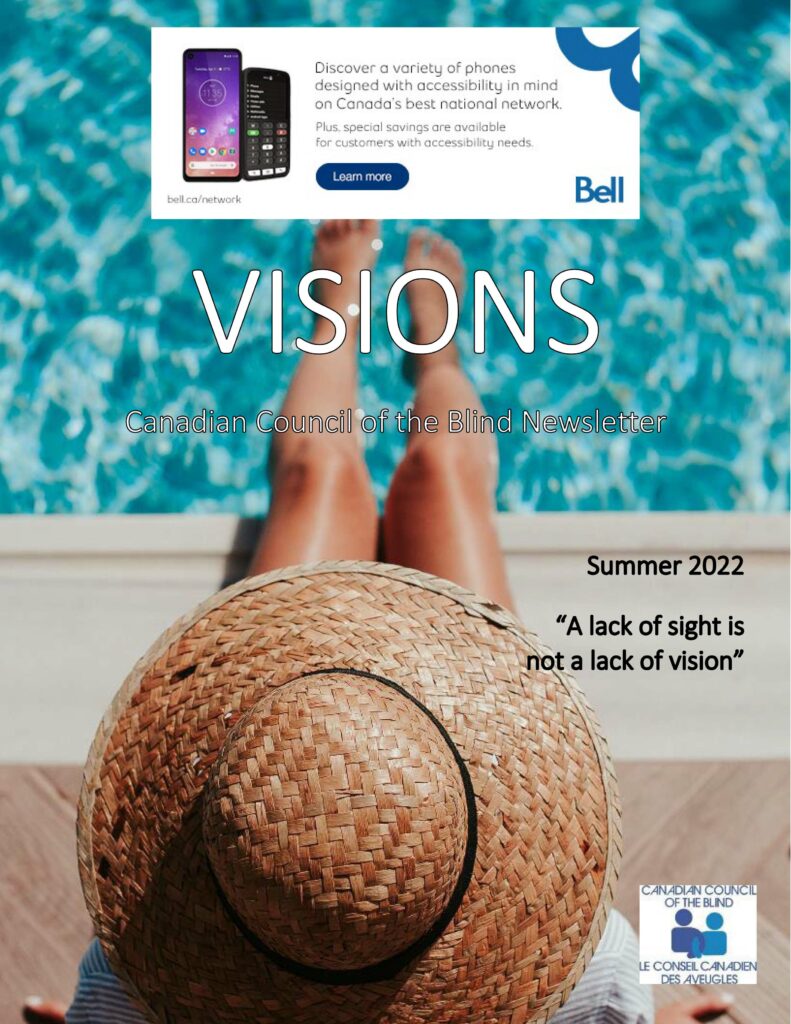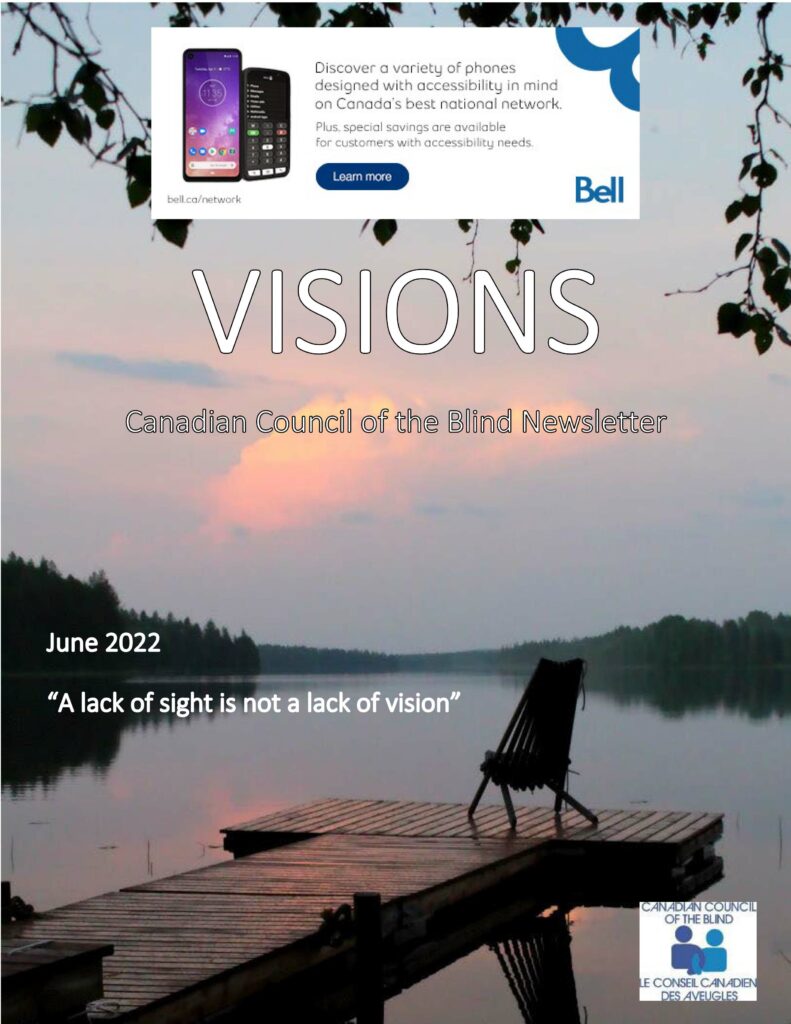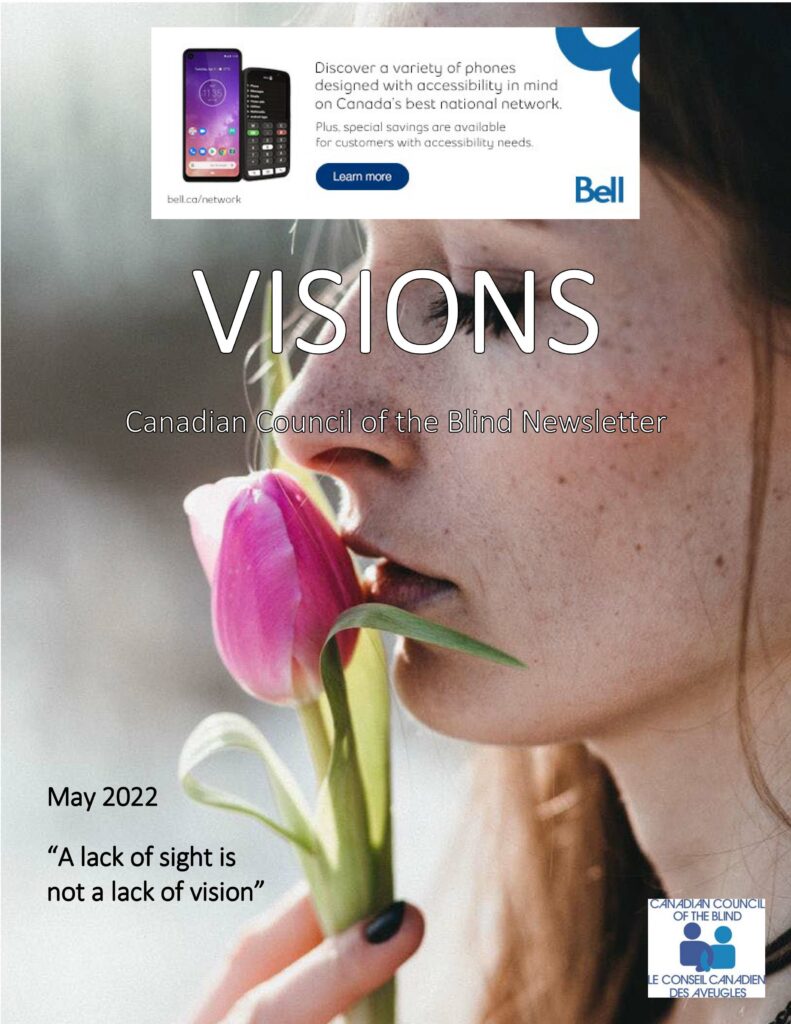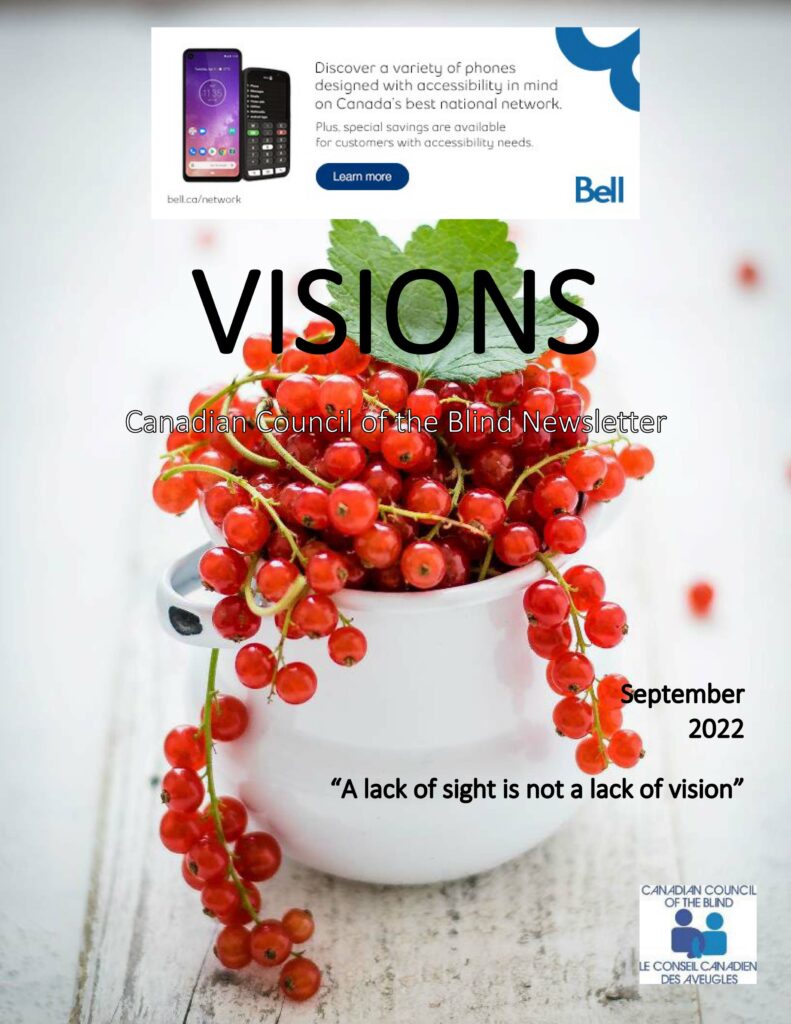
CAG Position Statement on Accessible Elections
Revised: July 28 2022
Issue
The Consumer Access Group (CAG) believes that all Canadians have the right to vote independently and privately, and this right is enshrined in human rights legislation. Canada’s current electoral process poses significant barriers to voters who are blind, deafblind or partially sighted due to a lack of:
- accessible and private options for independent voting; and
- awareness among elections officials about how to accommodate voters who are blind, deafblind or partially sighted.
Background
According to Statistics Canada’s 2017 Canadian Survey on Disability, 1.5 million Canadians self-identify as having a “seeing disability”. Following the 2019 general election, CNIB surveyed Canadians who are blind or partially sighted about their voting experiences. According to the survey results, only 69 percent of Canadians with total sight loss felt that their vote was secret, compared to 94 percent of voters with mild sight loss. In addition, only 17.6 percent of voters with total sight loss reported being able to vote with independence and privacy, compared to 70 percent of voters with mild sight loss. This data indicates that, while some voters with mild sight loss can vote with independence and privacy within the current system, most voters with total sight loss are not able to vote with independence and privacy.
In Canada, elections are held at all levels of government, including federal, provincial and territorial, and municipal. Elections are also held for self governing First Nations across the country. Each level of government has an independent, non-partisan agency that is responsible for administering elections and providing support and accommodations to electors, including those with disabilities. At the federal level, elections are governed by the Canada Elections Act and are administered by Elections Canada. At the provincial and territorial level, elections are administered by independent provincial or territorial election commissions, such as Elections Ontario and Elections Alberta. At the municipal level, elections are administered by the municipal government.
Due to this wide variation in election administration, there are no standardized supports and accommodations for people with disabilities across all levels of government. As a result, Canadians who are blind, deafblind or partially sighted face significant barriers to independent and private voting, such as the exclusive use of a pencil to mark a paper ballot which requires a blind, deafblind or partially sighted voter to have someone with sight help them complete their ballot.
Low and high technology solutions can remove barriers to voting for people who are blind or partially sighted. While some Canadians have been permitted to use accessibility apps on their personal devices to vote, there are no official policies and procedures in place to ensure that all voters have access to this accommodation.
Recommendations
In order to ensure independence and privacy for voters who are blind, deafblind or partially sighted, election administrators must:
- Permit voters who are blind, deafblind or partially sighted to use their preferred magnifying device behind the voting screen, including magnifier applications on a smart phone.
- Permit voters who are blind, deafblind or partially sighted to use smart phone applications that will allow them to read independently or connect to a sighted operator to assist with the marking and confirmation of their choice.
- Provide electronic voting machines that allow voters with disabilities to vote independently. These can be enhanced with various accessibility features, such as audio output, color contrast, large screen display, or a sip and puff device.
- Offer telephone and online voting options. Telephone voting is being used successfully in other countries, such as Australia, as well as within Canada, most recently in the 2020 British Columbia provincial election.
- Ensure that ballots adhere to guidelines such as those outlined in Clear Print Guidelines, including use of large print, clear font, and high contrast between text and background.
- Ensure availability of braille and large print candidate lists and braille and tactile overlay templates for ballots.
- Ensure that voter information cards and other print mailings adhere to guidelines such as those outlined in Clear Print Guidelines, are available in alternate formats upon request and can be identified by touch.
- Provide comprehensive training to elections staff to ensure that voters who are blind, deafblind or partially sighted have the support to vote with independence and privacy.
- Ensure that voting locations adhere to guidelines such as those outlined in Clearing Our Path, including high-contrast, large-print signage and being accessible by public transit.
- Ensure that elections websites adhere to the latest version of the Web Content Accessibility Guidelines (as of June 2022 this is WCAG 2.0).
- Provide funded access for qualified ASL/LSQ interpreters and Intervenor services.
Review Date: June 2023
Endorsed by:
Alliance for Equality of Blind Canadians(AEBC)
Canadian Council of the Blind (CCB)
Canadian National Institute for the Blind (CNIB)
the Consumer Access group
The Consumer Access Group (CAG) is a coalition of blindness related not for profit organizations. Each partner contributes their expertise to developing position statements on blindness related concerns. These statements enable organizations and individuals to advocate with a common voice on blindness-related issues, increasing the capacity of each to more effectively promote social inclusion for Canadians who are blind, deafblind and partially sighted.
Windsor Lawn Bowling Club to Host 2022 Canadian Para-bowls Championships
Bowls Canada Boulingrin (BCB) is pleased to announce Windsor Lawn Bowling Club will host the 2022 Canadian Para-bowls Championships. The events are expected to take place from September 11 – September 17, 2022.
The inaugural Para-bowls Championships is anticipated to feature both a singles event, as well as a team event for bowlers who are visually impaired or physically disabled. The event will be open registration, meaning provincial play downs won’t be necessary to qualify.
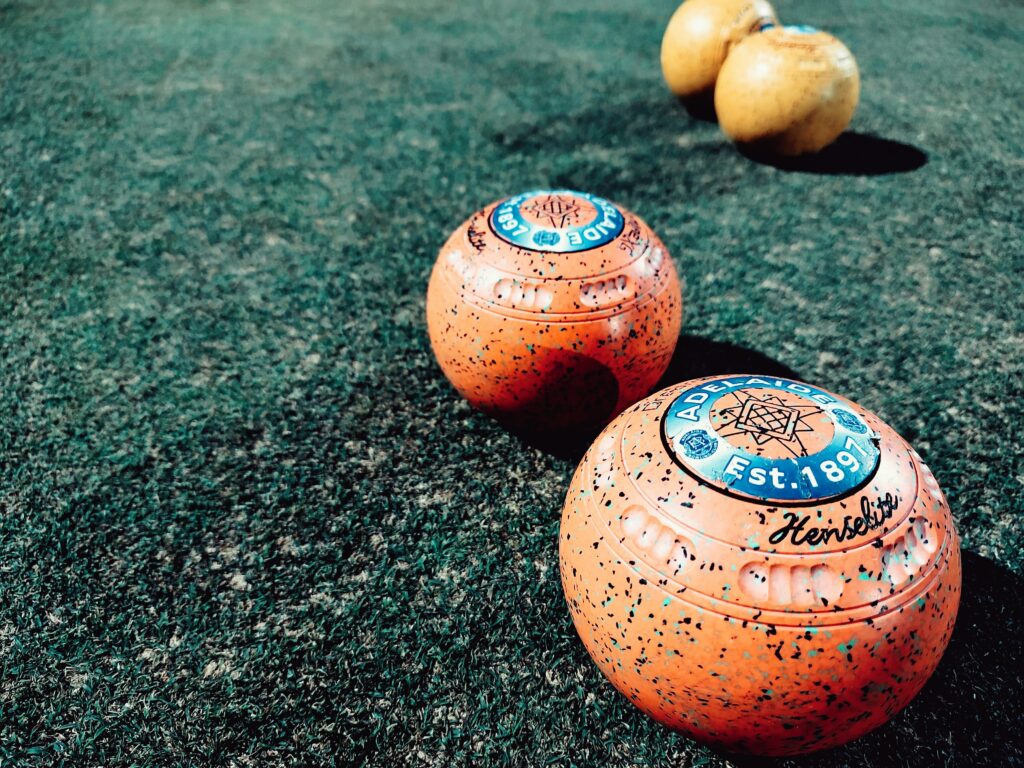
Ted Merritt, chair of the host organizing committee, said “The Windsor Lawn Bowling Club is very excited to be named the host club for the 2022 Canadian Para-Bowls Championships. It will be such an honour to host the inaugural Canadian Para-Bowls Championship where these athletes can show everybody that they belong and can perform on any stage just like the rest of the world’s athletes.”
With Windsor LBC having two greens, it is anticipated that the first few days will feature the Para-bowls singles discipline, followed by Para-bowls team events. The Para-bowls events are scheduled to take place from September 11-17.
With an unknown number of athletes descending on the Windsor club for over a week, the safety of all participants and volunteers will be paramount. The event will see increased safety mechanisms in place to keep COVID-19 at bay such as increased cleaning and sanitizing. Further measures for 2022 will include the elimination of sanctioned social events, no centralized accommodation and no organized shared transportation. While these measures will be a significant change from previous years, they were deemed necessary to ensure the likelihood of having safe competitions in 2022. Further COVID-specific requirements will be determined closer to the event in consultation with local public health authorities.
As the official awards and recognition supplier for BCB, Nothers The Award Store will provide all medals and awards for the event.
For more information, please contact Jake Schuknecht at jschuknecht@bowlscanada.com.
About Bowls Canada Boulingrin
Bowls Canada Boulingrin (BCB) is the governing body responsible for lawn bowls in Canada. The BCB mission is to advance the sport of bowls in Canada.
2451 Riverside Drive
c/o House of Sport
Ottawa, Ontario
K1H 7X7
Toll-free: 1-800-567-2695
Tel: 613-244-0021
Fax: 613-244-0041
office@bowlscanada.com
VISIONS – Summer
VISIONS – June
National AccessAbility Week
May 29 – June 4, 2022
Imagine a Canada where no one is left out. A Canada that does not just accommodate disability, but one that is disability inclusive from the start. That is the Canada we are creating – for everyone.
The NAAW webpage is available here: https://www.canada.ca/en/employment-social-development/campaigns/national-accessability-week.html
NAAW remains a valuable platform to engage with Canadians to bring national attention to the importance of accessibility and inclusion, and to celebrate the contributions of individuals, communities and workplaces that are actively removing barriers to accessibility across the country.
You can follow and share posts from @AccessibleGC on Twitter and from Accessible Canada on Facebook. Feel free to also use the hashtags #NAAW2022 and #InclusiveFromTheStart when referencing NAAW in social media posts.
In addition, we are looking forward to seeing you at the Government of Canada’s first annual Canadian Congress on Disability Inclusion which will be taking place on May 26 and May 27, 2022. If you have not already registered, please check out the Canadian Congress on Disability Inclusion website to register and follow #InnovatingTogether on social media for updates.
Vision Month Summit 2022
The Vision Health Month Summit took place on Monday, May 16 from 4:00 to 5:45 pm at Christ Church Cathedral in the Great Hall, located at 414 Sparks Street in Ottawa, Ontario.
TOPIC: Preventable Blindness Through a National Vision Health Strategy
SPEAKERS: Carol Hughes, MP, Algoma—Manitoulin—Kapuskasing, Ontario, Assistant Deputy Speaker and Deputy Chair of Committees of the Whole;
Dr. Keith Gordon, Senior Research Officer, Canadian Council of the Blind;
Dr. Chad Andrews, Director of Research and Policy, College of Optometrists of Ontario;
Doug Earle, President and CEO, Fighting Blindness Canada.
DATE: Monday, May 16, 2022
TIME: 4:00-5:45 pm EST
The Summit featured expert discussion to achieving the vision health community’s calls for:
- A National Vision Health Strategy that stresses prevention, research, treatment, and rehabilitation of vision loss, the implementation of which requires a coordinated effort on the part of federal, provincial, and territorial governments.
- It also stresses that Health Canada establish a Vision Health Desk within the Public Health Agency to clearly focus government efforts on the prevention, research, treatment, and rehabilitation of vision loss.
- Finally, it stresses the need for increased Vision Health Research Funding, which is presently woefully inadequate. Canada must invest to find treatments for blinding eye diseases and life-changing technologies for people currently living with vision loss.
VISIONS – May
White Cane Magazine – Vision Month Edition
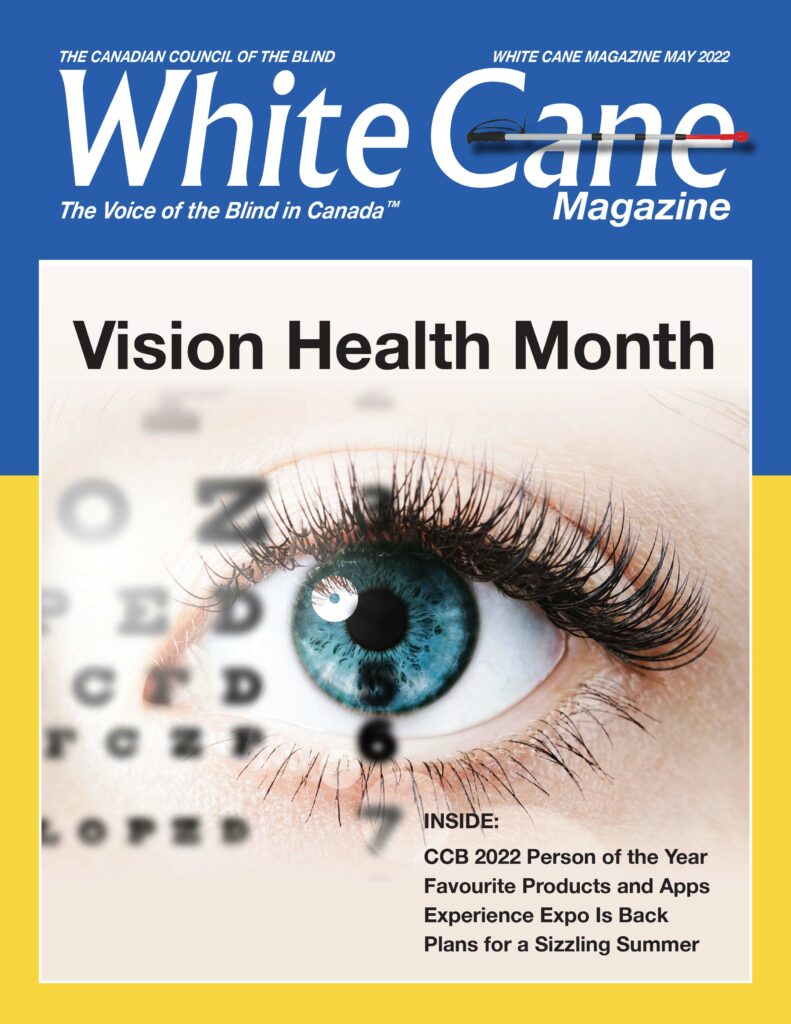
Welcome to White Cane Magazine. May has been dedicated as Vision Health Month. Check out this issue of White Cane Magazine to learn more about Vision Health Month and to:
- Meet the CCB’s Person of the Year and the President’s Award recipients
- Update yourself on the leading technology available to those living with vision loss, including new apps and products
- Proceeding without us
- Learn about patients’ rights and policy
- Understand why we’re looking to the feds for leadership on eye health
- Scan the special section on preventable blindness
- Read how VIA Rail is planning for a more inclusive travel experience
- Meet the ophthalmologists leading your eye care team
- Learn why eye care in Canada is facing an invisible crisis
- Learn about how companies are redefining digital health care
- Go fishing with blind outdoorsman Lawrence Gunther Euteneier
- Look at AMI’s plans for a sizzling summer
Enjoy the Read!
Download belowApril 27, International Guide Dog Day
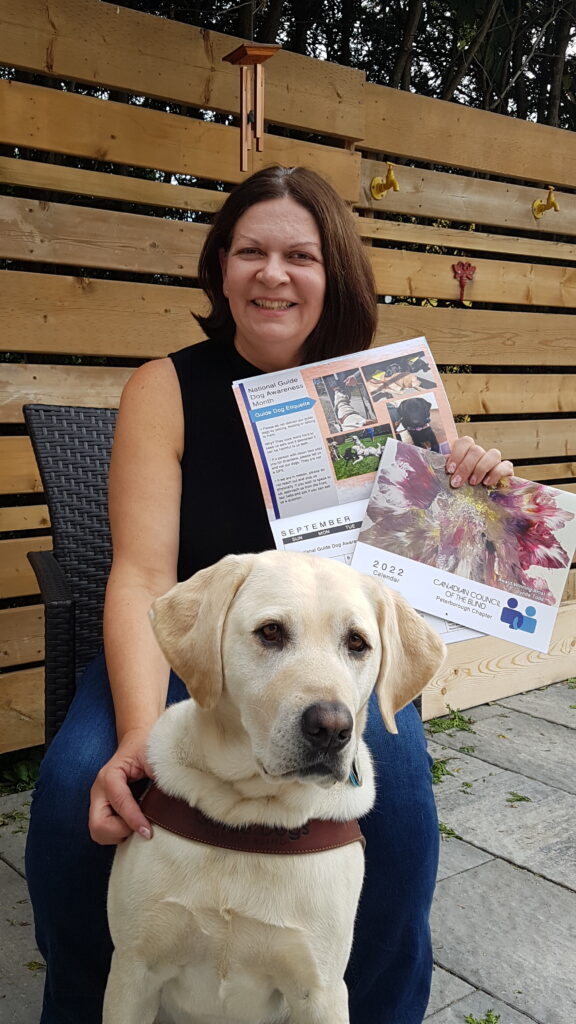
The Joys of a Guide Dog
By Leslie Yee
A young boy around the age of eight, once asked me, “if I could have all my sight back, would I want it.” At first, I was a little taken back. What a question and it made me really think.
I am really comfortable with my vision. I feel I do not miss anything and most importantly I would not have the company and companionship of my Guide Dog, Akira.
Akira is my first guide and it has so far been quite an adventure. He is strong, an 85-pound yellow male, intelligent and often looks at me as if to say, “the door is right here” see, {nose point}, see {nose point}, patient, very playful and is better than an alarm clock. Especially when it is dinner time.
He is now five and a half years old, and still, he will practically stand on his head just to get a kibble treat. This does make him very playful and willing to learn new and fun tricks for playtime.
Have we made mistakes? You bet. As a new handler I am constantly learning from Akira himself, and by asking other Handlers how they might react to certain situations. So together we then tackle our problems, our difficult situations and try again, accompanied by a lot of kibble treats.
Akira is from Guide dogs for the Blind in the United States. It was a wonderful experience going there and getting the training I needed, meeting Akira and then learning to bond and work with him. The school did tell us all that once you have a Guide dog, you are now ambassadors for all guide dogs and handlers. They were right. Both of us receive a lot of attention. We are asked many questions, and I am given general comments on how lovely Akira is. We don’t mind though; Akira is amazing and I am happy and proud to talk about him. Not only do I feel stronger with him, he is a part of me. I am very proud and confident of him when we are out and I have confidence in the training he has received from his school.
So, if I could get all of my vision back, would I want it? I don’t think so, at least not right now. I love my Guide Dog partner and together we make a great team.

